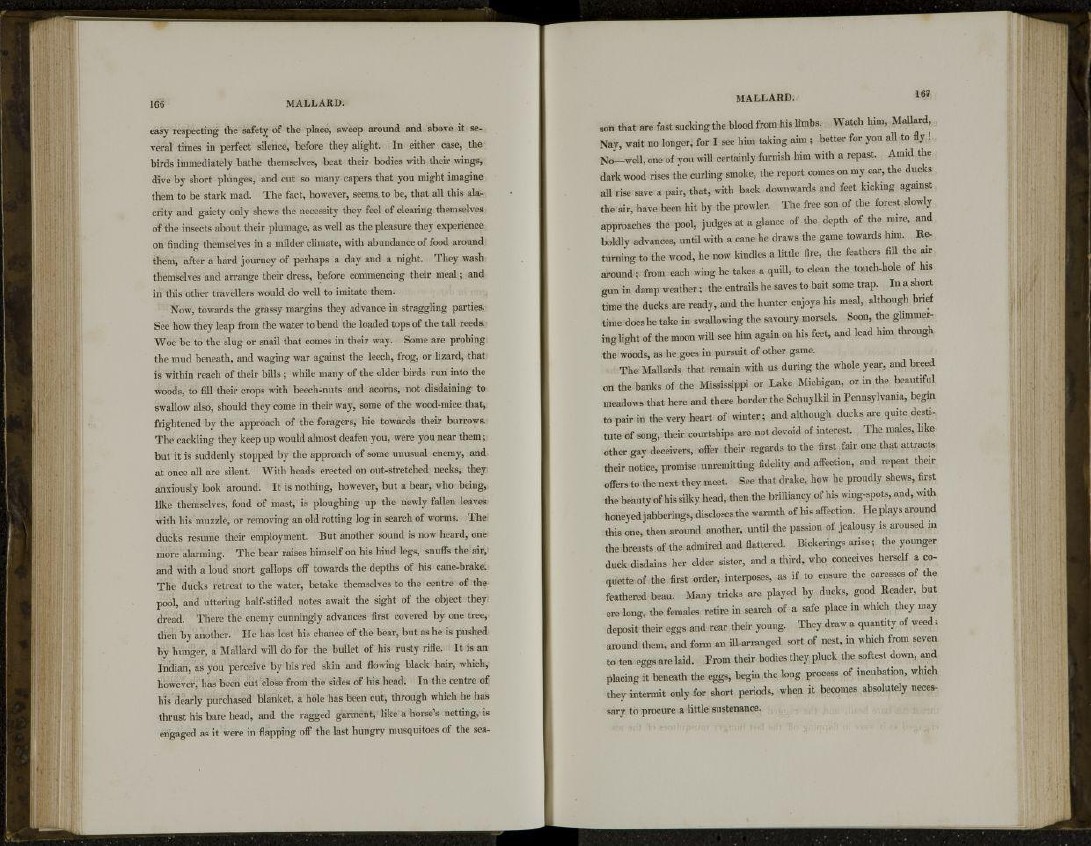
1G6 MALLARD.
easy respecting the safety of the place, sweep around and above it several
times in perfect silence, before they alight. In either case, the
birds immediately bathe themselves, beat their bodies with their wings,
dive by short plunges, and cut so many capers that you might imagine
them to be stark mad. The fact, however, seems, to be, that all this alacrity
and gaiety only shews the necessity they feel of clearing themselves
of the insects about their plumage, as well as the pleasure they experience
on finding themselves in a milder climate, with abundance of food around
them, after a hard journey of perhaps a day and a night. They wash
themselves and arrange their dress, before commencing their meal; and
in this other travellers would do well to imitate them.
Now, towards the grassy margins they advance in straggling parties.
See how they leap from the water to bend the loaded tops of the tall reeds.
Woe be to the slug or snail that comes in their way. Some are probing
the mud beneath, and waging war against the leech, frog, or lizard, that
is within reach of their bills ; while many of the older birds run into the
woods, to fill their crops with beech-nuts and acorns, not disdaining to
swallow also, should they come in their way, some of the wood-mice that,
frightened by the approach of the foragers, hie towards their burrows.
The cackling they keep up would almost deafen you, were you near them;
but it is suddenly stopped by the approach of some unusual enemy, and
at once all are silent. With heads erected on out-stretched necks, they
anxiously look around. It is nothing, however, but a bear, who being,
like themselves, fond of mast, is ploughing up the newly fallen leaves
with his muzzle, or removing an old rotting log in search of worms. The
ducks resume their employment. But another sound is now heard, one
more alarming. The bear raises himself on his hind legs, snuffs the air,
and with a loud snort gallops off towards the depths of his cane-brake.
The ducks retreat to the water, betake themselves to the centre of the
pool, and uttering half-stifled notes await the sight of the object they
dread. There the enemy cunningly advances first covered by one tree,
then by another. He has lost his chance of the bear, but as he is pushed
by hunger, a Mallard will do for the bullet of his rusty rifle. It is an
Indian, as you perceive by his red skin and flowing black hair, which,
however, has been cut close from the sides of his head. In the centre of
his dearly purchased blanket, a hole has been cut, through which he has
thrust his bare head, and the ragged garment, like a horse's netting, is
engaged as it were in flapping off the last hungry musquitoes of the sea-
MALLARD. 167
son that are fast sucking the blood from his limbs. Watch him, Mallard,
Nay, wait no longer, for I see him taking aim ; better for you all to fly !
No—well, one of you will certainly furnish him with a repast. Amid the
dark wood rises the curling smoke, the report comes on my ear, the ducks
all rise save a pair, that, with back downwards and feet kicking against
the air, have been hit by the prowler. The free son of the forest slowly
approaches the pool, judges at a glance of the depth of the mire, and
boldly advances, until with a cane he draws the game towards him. Returning
to the wood, he now kindles a little fire, the feathers fill the air
around; from each wing he takes a quill, to clean the touch-hole of his
gun in damp weather; the entrails he saves to bait some trap. In a short
time the ducks are ready, and the hunter enjoys his meal, although brief
time does he take in swallowing the savoury morsels. Soon, the glimmering
light of the moon will see him again on his feet, and lead him through
the woods, as he goes in pursuit of other game.
The Mallards that remain with us during the whole year, and breed
on the banks of the Mississippi or Lake Michigan, or in the beautiful
meadows that here and there border the Schuylkil in Pennsylvania, begin
to pair in the very heart of winter; and although ducks are quite destitute
of song, their courtships are not devoid of interest. The males, like
other gay deceivers, offer their regards to the first fair one that attracts
their notice, promise unremitting fidelity and affection, and repeat their
offers to the next they meet. See that drake, how he proudly shews, first
the beauty of his silky head, then the brilliancy of his wing-spots, and, with
honeyed jabberings, discloses the warmth of his affection. He plays around
this one, then around another, until the passion of jealousy is aroused in
the breasts of the admired and flattered. Bickerings arise; the younger
duck disdains her elder sister, and a third, who conceives herself a coquette
of the first order, interposes, as if to ensure the caresses of the
feathered beau. Many tricks are played by ducks, good Reader, but
ere long, the females retire in search of a safe place in which they may
deposit their eggs and rear their young. They draw a quantity of weed s
around them, and form an ill-arranged sort of nest, in which from seven
to ten eggs are laid. From their bodies they pluck the softest down, and
placing it beneath the eggs, begin the long process of incubation, which
they intermit only for short periods, when it becomes absolutely necessary
to procure a little sustenance.